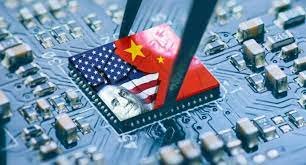In response to escalating tensions with the United States, China has initiated the creation of its largest chip fund to date, aiming to bolster its semiconductor industry and mitigate the impact of US-imposed restrictions. The National Integrated Circuit Industry Investment Fund is orchestrating the endeavor, gathering more than $27 billion from a consortium of local governments and state-owned enterprises. This initiative marks a significant escalation in China’s efforts to achieve technological self-sufficiency and reduce dependence on foreign semiconductor suppliers.
The fund, expected to surpass the 200 billion yuan mark set by its predecessor, reflects China’s determination to advance its semiconductor capabilities amidst growing geopolitical challenges. The move comes amidst Washington’s concerted efforts to curb China’s technological ascendancy, particularly in critical sectors such as semiconductors. By mobilizing substantial financial resources, China aims to accelerate the development of cutting-edge technologies and enhance its competitiveness in the global semiconductor market.
The significance of this initiative extends beyond economic considerations, as semiconductors play a pivotal role in modern technology, powering a wide array of devices ranging from smartphones to advanced weaponry. As such, control over semiconductor production and innovation has emerged as a key battleground in the broader geopolitical rivalry between China and the United States. China’s move to bolster its semiconductor industry underscores its strategic imperative to achieve technological autonomy and reduce vulnerability to external disruptions.
The establishment of this mammoth chip fund signals China’s intent to cultivate a robust ecosystem for semiconductor research, development, and manufacturing. By leveraging the expertise of local governments and state enterprises, China seeks to foster collaboration and synergies across the semiconductor value chain, from design to fabrication. This concerted effort reflects China’s recognition of the strategic importance of semiconductor technology in driving economic growth and national security.
In recent years, China has ramped up its investments in semiconductor research and development, aiming to bridge the technological gap with established players such as the United States and South Korea. The creation of the $27 billion chip fund represents a significant milestone in China’s quest for technological supremacy, signaling its commitment to overcoming existing barriers and achieving self-reliance in critical industries.
However, China’s ambitious semiconductor ambitions are not without challenges. The global semiconductor industry is highly competitive and capital-intensive, requiring substantial investments in research, talent, and infrastructure. Moreover, China faces persistent scrutiny and skepticism regarding intellectual property protection and fair trade practices, which could impede its efforts to attract foreign investment and collaboration.
Nevertheless, China’s unwavering commitment to bolstering its semiconductor industry underscores its determination to assert itself as a technological powerhouse on the world stage. As geopolitical tensions continue to escalate, the semiconductor sector is likely to remain a focal point of competition and collaboration between China and the United States, with far-reaching implications for global innovation and economic dynamics.












Comments 1